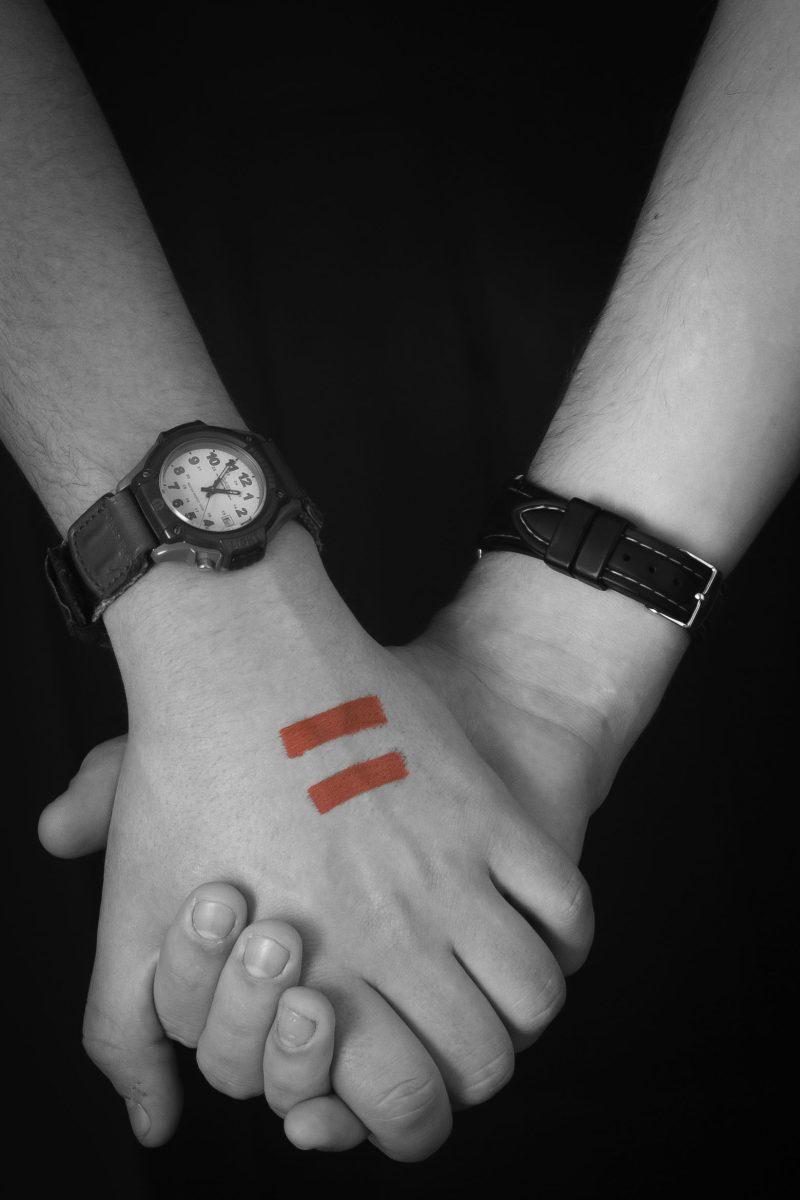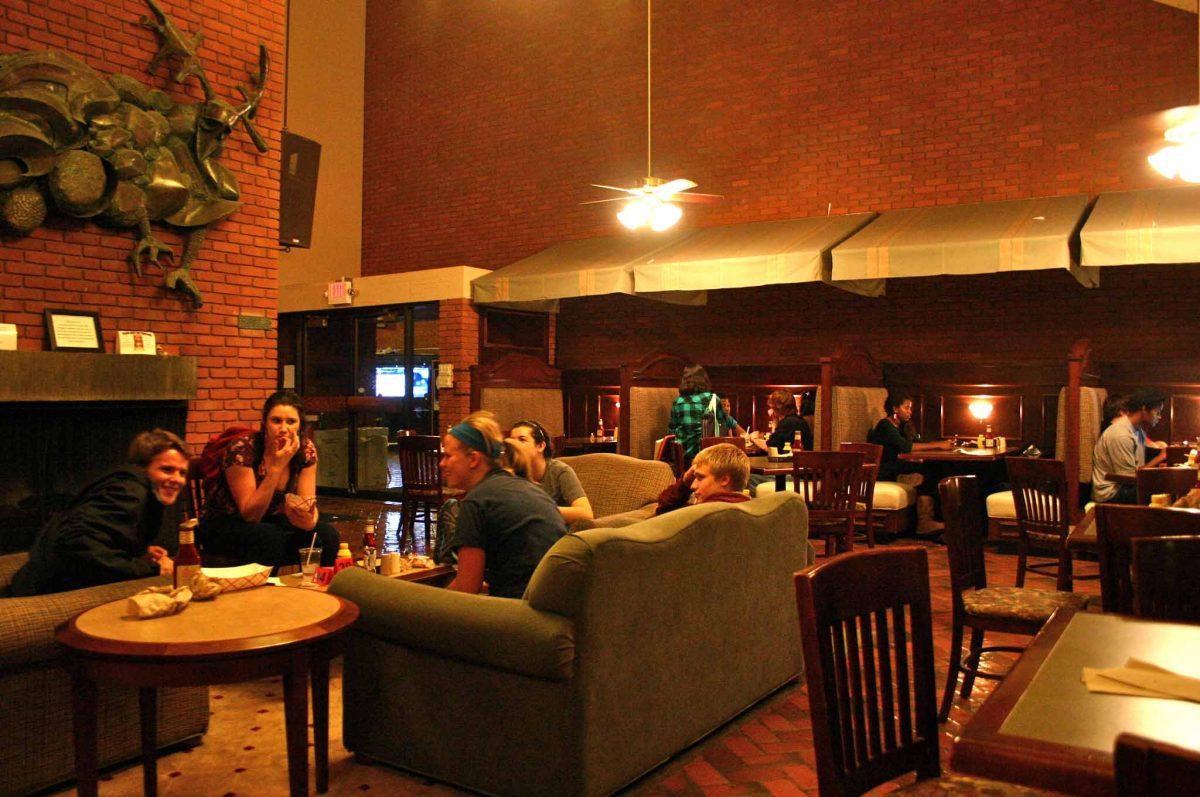In one of its most significant social policy changes in decades, Principia last month announced that sexual orientation would no longer be a factor in regards to admissions practices, community living, and employment at Principia. The campus Yik Yak feed — the prevailing form of student social media — was abuzz with reactions that were mixed though largely positive, ranging from “I am so damn proud of gays persevering through years of discrimination. Truly an inspiration,” to “I don’t like the new policy. My chances were low then, but now the girls here don’t even have to date my gender anymore!” There were no public displays in favor or opposition of the change.
The strength of sentiments on this issue as well as the length of time it has been debated underscore the magnitude of this change.
For decades student activists at Principia College have campaigned for a change in the homosexuality policy. Since 2001, the Trustees have had the policy on their agenda. Although never explicitly documented, the policy was an unwritten agreement among admissions and the administration. In recent years, student activists have been involved in open discussions on homosexuality, have staged sit-ins, and held meetings with the Trustees regarding changing the policy. In the fall of 2013, students on campus created a new, unofficial club called the Gay Straight Alliance (GSA). The GSA was not allowed to receive recognition or funding as an official club because of its affiliation with sexuality.
At the end of spring semester 2013, a distinguished faculty member and Professor Emeritus of Music at Principia, Dr. John Near, stepped down from his post in the music department. As a member of the faculty that identified as a homosexual, Near said in his comments to The Pilot that he felt he needed to leave Principia because he “could no longer tolerate unjust discrimination and the concomitant repressive atmosphere.” After leaving, Near submitted an open letter on his feelings regarding the homosexuality policy and his treatment at Principia that went viral around the Principia community, spreading to students, faculty, and alumni. His good friend and music faculty colleague, Dr. Marie Juriet-Beamish left the following spring, due to Principia’s treatment of Near, and the fact that she felt she was not openly allowed to voice her opinions in favor of the policy.
At the beginning of this semester, College President Dr. Jonathan Palmer gave an address at Fall Convocation, at which many were under the impression a policy announcement was going to be made. His speech stressed the metaphysical theme for the year, “Love thy neighbor” which seemed to many students to be foreshadowing a change in the policy. The policy was not mentioned at all during the speech. In an interview afterwards, Palmer said that the homosexuality policy had not even been a consideration when he had prepared his speech.
It was expected that the homosexuality policy was going to resurface at the Trustees’ annual meeting on the College campus, November 6-8. However, when the usual meeting review email was sent out on November 14, the policy was not mentioned. The review simply highlighted updates such as tuition increases, the approval of the strategic plan for 2015-2020 and approval of fundraising for the Voney renovation project. Many students and faculty were curious as to why the email did not address the policy, since in the past, meeting review emails included mention of the policy. November 2013’s email update came with a request, “join the Board in considering this question by challenging all forms of sensuality and raising thought to a more spiritual understanding of relationships. We [the Board of Trustees] look forward to seeing the positive effect of this prayerful work.” A similar indication that the Board was continuing to prayerfully address the topic was expected in the November 14 email.
On the morning of November 18, an email was sent to all College students, faculty, and staff proving that the Board had indeed discussed the homosexuality policy at their November meeting. In their official statement the Board of Trustees stated, “In light of Principia’s primary purpose to serve the Cause of Christian Science, the Board recognizes that sexual orientation does not prevent an individual from healing or making contributions to the growth of Christian Science around the world.” Some saw this as direct validation of the College’s metaphysical theme.
The Trustees continued, “All students, faculty, and staff shall be perceived, welcomed, loved, and supported as spiritual ideas. They are expected to honor the community standards of moral and spiritual purity in relationships. In terms of practices at Principia regarding admissions, community standards for living in the Principia community, and employment at Principia, we are directing the administration to establish consistent rules and regulations for students, faculty, and staff, regardless of sexual orientation.” The statement outlined that the policy change would be effective immediately on both the College and the St. Louis campuses, but that it’s implementation would be different.
Students on the College campus had varying opinions regarding the update. Social media was on fire that morning, with Yik Yak and Facebook feeds filled with comments on the policy change. Most Facebook posts were in favor including Senior Lucy Weber’s “WHAT A HUGE STEP, PRINCIPIA!!” and Sophomore Kai Patterson’s “What a historic day for Principia! Sexual Orientation is no longer discriminated! All are welcome here!” Sophomore Jackson Walker posted, “This change in policy at Principia is the best birthday present I could have asked for.” Sophomore Nohemy Johnson also echoed the positive thoughts, posting, “Wow Principia has taken a huge step in the right direction. Finally there will no longer be a policy discriminating against a group of people based on sexual orientation. This is AMAZING!!!” Posts continued to reflect a positive reaction. Recent graduate Nathan Wright posted “Prin, I’m legitimately impressed,” while Senior Alice Batista posted, “‘Progress is the law.’ – MBE Yes indeed!!!! #Principia.”
While Facebook posts were overwhelmingly positive, the Yik Yak feed offered a greater range. One Yakker posted, “Dammit, I hate how I woke up this morning and everyone was gay and God smote Prin for being sinners and not following Him. Oh wait, that didn’t happen. Back to your regularly scheduled programming.” Another less than positive Yakker posted, “HAHAHAHA now you’ve all been exposed to the gay agenda! Enjoy your improved fashion sense and tolerance, dorks!” An unhappy member of Ferguson House also let it be known that, “ATTENTION: Ferguson House will be exercising its option to continue its practice of discrimination based on sexual orientation in regards to admission to the house.” On the other hand, one Yakker posted, “Confession: I can now be who I am on the inside and stop hating myself for who I love. This is one of the greatest days of my life 🙂 🙂 :).” A fellow Yakker replied to the post, “Your story brings a tear to my eye. We love you so much! I am so happy to hear this!”
Both Dr. John Near and Dr. Marie Jureit-Beamish were contacted for their thoughts on the policy change. In response to the change, Near wrote in an email, “I am heartened to read that the Principia Board of Trustees has finally changed its position on sexual orientation and that faculty, staff, and students who do not identify as heterosexuals are now welcome to enroll or work at Principia without fear of discrimination or retribution. At the same time, it is important that the rift be healed between Principia and the LGBT students of Christian Science—past and present—who chose not to apply, were counseled that they needed to be healed, were asked to leave, or had to live in secrecy because of their sexual orientation. In addition are those who have strong feelings in favor of the former practice. All must be brought harmoniously and compassionately into the fold.”
Near continued, “The fallout of Principia’s discrimination has been measurable. I had planned to remain on the faculty a few more years, and I know others like myself have left because they could no longer tolerate unjust discrimination and the concomitant repressive atmosphere. It is admirable to put supporting the Cause of Christian Science and Principia’s Mission above all personal considerations, but being forced to lie about oneself in order to serve is no small matter in view of Christian Science teachings. I am grateful that present and future LGBT Christian Scientists who wish to study or work at Principia do not have to live with that anxiety and the guilt it engenders. But the harm done to Principia and in a larger sense the Christian Science Movement by the anti-LGBT position needs healing. The Trustees’ announcement is only the first step in this process. At least they have now recognized and stated publicly: “sexual orientation does not prevent an individual from healing or making contributions to the growth of Christian Science around the world.” That has long been a proven fact.”
Jureit-Beamish echoed Near’s thoughts, stating, “It was just 25 years ago that the Berlin Wall came down, thus marking the end of one of the most repressive and dark times for the citizens of Germany. Drawing the parallel with this historic moment in modern history to celebrate freedom, we can also now celebrate the recent announcement by the Board of Trustees that includes the following embracing statement of inclusion for our fellow man: ‘All students, faculty, and staff shall be perceived, welcomed, loved, and supported as spiritual ideas.’
She further continued on Near’s point regarding the healing that now needs to take place writing, “For the last 25 years, Germany has dedicated enormous resources in correcting the wrongs of the past; likewise, the healing process at Principia College will require great efforts to right the errors of its past. The clouds of darkness have lifted, and the light of Truth will burn brightly on all associated with this new day in the history of Principia.”
Several alumni also shared their views on the change via the GSA Facebook page. Bruce Stores posted, “In view of Prin’s new policy re: the new LGBT acceptance, it should be exciting when the first students come out of the closet. That will happen, won’t it? And then re: the next dance. Will same-sex couples dance together? Should be interesting – all of this. Congratulations Principia College!” Amy Fredericks commented on the post, “Same sex marriage in the chapel? :)) now that would be a breakthrough.” Benjamin Doerr also posted his respects, “You all [GSA members] did such wonderful, restorative work. Look at the light shining through. Look at the difference we’ve made. For those of you fairly new to Principia, let me assure you this is no small victory. This is game changing. For many, this is life-changing. Well done!” Again, there were no alumni posts visible that were outwardly against the policy change. That is not to say that people are not opposed to the Trustees’ decision.
It should be noted that the Trustee’s statement also specifically addressed clubs, clearly stating that clubs focused on the issues of sexuality would continue to be denied recognition. Following the announcement, GSA changed it’s name to Spectrum and updated the group’s purpose statement to read, “We are dedicated to moving the thought and culture of campus forward through education and discussion to develop greater respect for and understanding of the issues of underrepresented groups, including the LGBTQIA+ community and other minority clubs at Principia.” The club has yet to receive official status.
Regardless of favor, this decision clearly took a significant amount of thought, prayer, and input from students, faculty, staff, and alumni. As the Trustees stated, “We have prayed about, discussed, and considered this topic, especially within the context of the Purpose and Policies of Principia, as well as the writings of Mary Kimball Morgan, the founder of Principia, the works of Mary Baker Eddy, the Discoverer and Founder of Christian Science, and the Bible. We have received input from a broad range of alumni, students, faculty, and staff, as well as parents and other friends of Principia, and we thank everyone for their prayers, as well as their thoughtful and heartfelt contributions.” A visible difference in the day to day activities at the College is yet to be seen and it is apparent that it will take time for the policy change to actually be implemented.
At the School, reactions have been quite different, with some parents more openly opposed to the change. At the Upper School Chapel on Monday, in front of all Middle and Upper School students as well as parents and community members, Principia parent and practitioner Scott Shivers publicly shared his views against the policy during his Chapel address.
It remains to be seen how the policy will affect admissions and social life on both campuses. However, to put the policy change in perspective, the Trustees noted in their directive: “Although not widely acknowledged, Principia’s history reveals that, for many years, homosexuals have been part of our community as students, faculty, and staff.” Now they will be recognized as such.






M • Jan 30, 2015 at 2:00 am
Great article, but I’m not sure why you said “Although never explicitly documented, the policy was an unwritten agreement among admissions and the administration,” considering the policy was clearly stated in the Blue Pages and admissions applications asked clearly whether or not applicants were “homosexual.”
M • Jan 30, 2015 at 2:00 am
Great article, but I’m not sure why you said “Although never explicitly documented, the policy was an unwritten agreement among admissions and the administration,” considering the policy was clearly stated in the Blue Pages and admissions applications asked clearly whether or not applicants were “homosexual.”
Bruce Stores • Jan 19, 2015 at 9:06 am
Thank you to The Pilot and to Annika Fredrickson for the outstanding article, “A Historic Change.” It is a fine piece of journalism. You covered the decision by the Trustees and the reactions to it superbly.
I have one quibble, however. Can The Pilot and the College community stop using the words “homosexual” and “homosexuality”? Here’s why:
The words are not pejorative. But they also hearken back to a time when many people were considered to be lower than dirt. Homosexuals were thought of as perverse, lonely, unhappy, and unlawful people. They were deemed so only because they happened to be physically attracted to those of their own gender. Also, these words have their origin in clinical (medical) psychology.
On the other hand, we have the word “gay.” According to http://www.dictionary.com, the definition of “gay” also includes: “cheerful”, “joyous” “happy”, “jovial” and “vivacious.” Aren’t these qualities we all aspire to? More importantly perhaps, the word “gay” doesn’t include the term, “sexual.” And isn’t that what the Trustees and others want to draw our attention away from? With the Trustees historic decision behind us, this may be an opportune time for such a change. And from what I’ve heard, the Trustees recent decision has made many people cheerful, joyous, happy, and, dare I say it: gay.
Bruce Stores
Father of David Stores (class of ’96)
(Bruce Stores is the author of “CHRISTIAN SCIENCE: Its Encounter with Lesbian/Gay America”)
Bruce Stores • Jan 19, 2015 at 9:06 am
Thank you to The Pilot and to Annika Fredrickson for the outstanding article, “A Historic Change.” It is a fine piece of journalism. You covered the decision by the Trustees and the reactions to it superbly.
I have one quibble, however. Can The Pilot and the College community stop using the words “homosexual” and “homosexuality”? Here’s why:
The words are not pejorative. But they also hearken back to a time when many people were considered to be lower than dirt. Homosexuals were thought of as perverse, lonely, unhappy, and unlawful people. They were deemed so only because they happened to be physically attracted to those of their own gender. Also, these words have their origin in clinical (medical) psychology.
On the other hand, we have the word “gay.” According to http://www.dictionary.com, the definition of “gay” also includes: “cheerful”, “joyous” “happy”, “jovial” and “vivacious.” Aren’t these qualities we all aspire to? More importantly perhaps, the word “gay” doesn’t include the term, “sexual.” And isn’t that what the Trustees and others want to draw our attention away from? With the Trustees historic decision behind us, this may be an opportune time for such a change. And from what I’ve heard, the Trustees recent decision has made many people cheerful, joyous, happy, and, dare I say it: gay.
Bruce Stores
Father of David Stores (class of ’96)
(Bruce Stores is the author of “CHRISTIAN SCIENCE: Its Encounter with Lesbian/Gay America”)